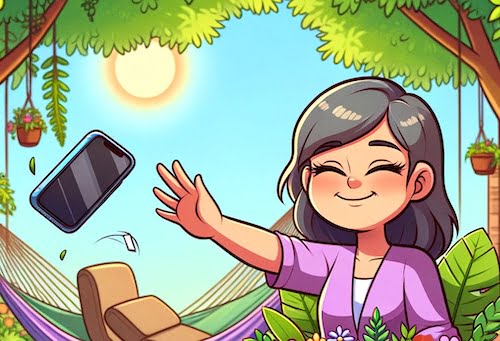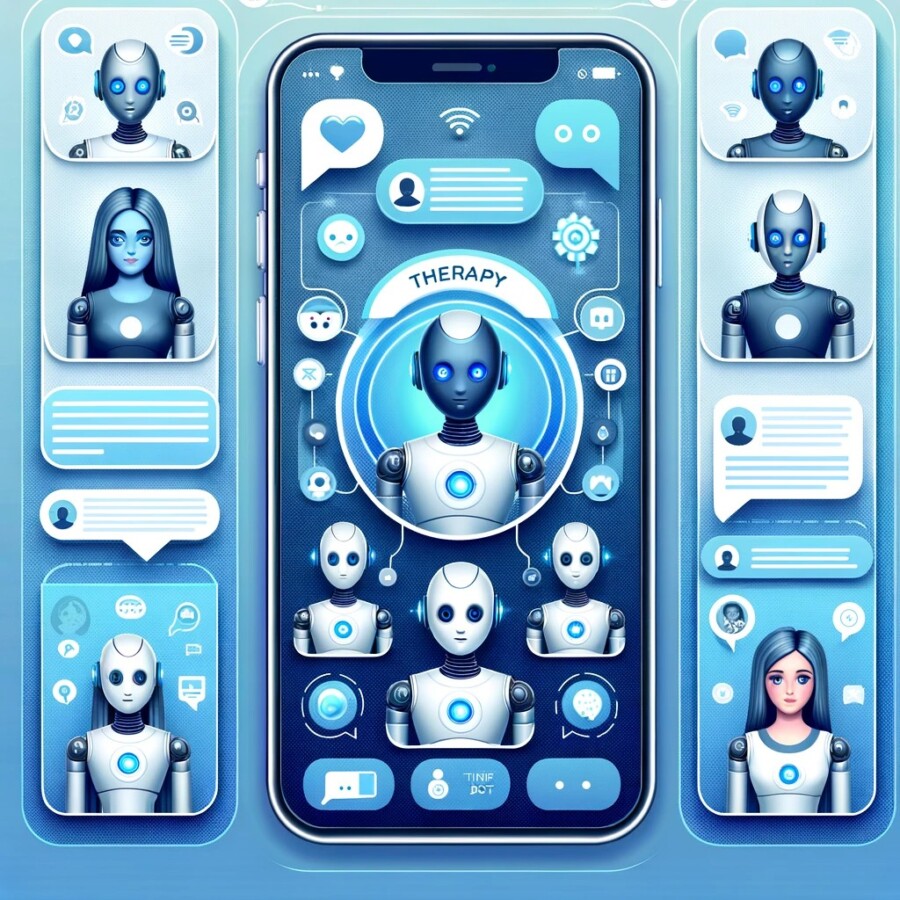More and more people are using something called “monk mode” to cut down on how much they use social media. Basically, it means focusing on one thing without getting distracted by technology. There are apps like Freedom, ColdTurkey, FocusMe, and Forest that can help with this. They let you block certain social media sites or even turn off the internet completely. These apps are becoming really popular because people are realizing that social media can be addictive and it’s hard to stop checking notifications and scrolling through feeds.
Susie Alegre, a human rights lawyer and writer, uses the Freedom app to block social media when she needs to concentrate on her work. She thinks it’s really tough to rely on willpower alone to stop using your phone. Grace Marshall, a writer and productivity coach, says that social media and work emails can distract us and make us want instant gratification. She thinks workplaces should set rules about how quickly people need to respond to messages or emails to help protect their work-life balance and mental health.
The person who made the Freedom app, Fred Stutzman, came up with it because he realized he was spending too much time on Facebook instead of working on his dissertation. He thinks social media platforms are designed to be addictive and hard to resist. Stutzman sees his app as a way to fight back against technology and take control of our digital habits. During the pandemic, lots more people have started using the Freedom app. The most blocked sites are Instagram, Facebook, and Twitter.
If you don’t want to use an app, Mark Channon, a coach who helps people be more productive, suggests making small changes to your daily routine to cut down on distractions. He says you should figure out what the most important thing you need to do that day is and focus on that. Vladimir Druts, who helped create the FocusMe app, thinks it’s really important to take social media addiction seriously. He sees monk mode as a way to fight against our need for instant gratification. Druts thinks that as technology gets even more distracting with things like artificial intelligence, monk mode will become even more important.
Original news source: The people going ‘monk mode’ to limit social media use (BBC)
Listen
Slow
Normal
Fast
Group or Classroom Activities
Warm-up Activities:
– News Summary
Instructions: Have students read the article individually and then write a summary of the main points. They should focus on summarizing the key ideas and information in their own words. Afterward, they can share their summaries in pairs or small groups and discuss any differences or similarities they noticed.
– Opinion Poll
Instructions: Divide the class into pairs or small groups. Each group will brainstorm a list of questions related to the topic of social media addiction and monk mode. They can ask questions like “Do you think social media is addictive?” or “Do you think using apps like Freedom can help reduce social media use?” Afterward, each group will conduct an opinion poll by asking their questions to other groups or individuals in the class. They should record the responses and then share their findings with the class.
– Pros and Cons
Instructions: Divide the class into two teams. One team will brainstorm the pros of using monk mode or apps like Freedom to reduce social media use, while the other team will brainstorm the cons. Each team will write their ideas on a whiteboard or flip chart. Afterward, the teams will take turns presenting their lists and discussing their points. The class can then have a group discussion and share their own thoughts and opinions on the topic.
– Think-Pair-Share
Instructions: Have students think individually about a time when they felt distracted by social media or technology and couldn’t focus on a task. They should reflect on how it made them feel and any negative consequences it may have had. Then, they should pair up with a partner and share their experiences, listening to their partner’s story as well. Afterward, the pairs can share their stories with the whole class and discuss strategies for staying focused and reducing distractions.
– Future Predictions
Instructions: In small groups, have students discuss and make predictions about the future of social media addiction and the use of monk mode or similar apps. They should consider how technology may continue to evolve and impact our lives, as well as the potential consequences and benefits of reducing social media use. Each group will present their predictions to the class and engage in a discussion about the possibilities and challenges that lie ahead.
Comprehension Questions:
1. What is “monk mode” and why are more people using it?
2. How do apps like Freedom, ColdTurkey, FocusMe, and Forest help people cut down on social media use?
3. Why does Susie Alegre use the Freedom app?
4. According to Grace Marshall, how can social media and work emails distract us?
5. Why did Fred Stutzman create the Freedom app?
6. Which social media platforms are most commonly blocked by the Freedom app?
7. What suggestion does Mark Channon give for cutting down on distractions without using an app?
8. Why does Vladimir Druts believe monk mode will become even more important in the future?
Go to answers ⇩
Listen and Fill in the Gaps:
More and more people are using some(1)______ called “monk mode” to cut down on how much they use social media. Basically, it means focusing on one thing without getting distracted by technology. There are apps like Freedom, ColdTurkey, FocusMe, and Forest that can help with this. They let you block certain social media sites or even turn off the (2)______ completely. These apps are becoming really popular because people are (3)______ that social media can be addictive and it’s hard to stop checking notifications and scrolling through (4)______.
Susie Alegre, a human rights lawyer and writer, uses the Freedom app to block social media when she needs to concentrate on her work. She thinks it’s really tough to rely on willpower alone to stop using your phone. Grace Marshall, a writer and productivity coach, says that social media and work (5)______ can distract us and make us want instant gratification. She thinks (6)______ should set rules about how quickly people need to respond to (7)______ or emails to help protect their work-life (8)______ and mental health.
The person who made the Freedom app, Fred Stutzman, came up with it because he realized he was spending too much time on Facebook instead of working on his dissertation. He (9)______ social (10)______ platforms are designed to be (11)______ and hard to resist. Stutzman sees his app as a way to fight back against technology and take control of our digital habits. During the pandemic, lots more people have (12)______ using the Freedom app. The most blocked sites are Instagram, Facebook, and Twitter.
If you don’t want to use an app, Mark Channon, a coach who helps people be more productive, suggests making small changes to your daily routine to cut down on distractions. He says you should figure out what the most important thing you need to do that day is and (13)______ on that. (14)______ (15)______, who helped create the FocusMe app, thinks it’s really important to take social media addiction seriously. He sees monk mode as a way to fight against our need for instant gratification. Druts thinks that as (16)______ gets even more distracting with things like artificial intelligence, monk mode will become even more important.
Go to answers ⇩
Discussion Questions:
Students can ask a partner these questions, or discuss them as a group.
1. What is “monk mode” and how can it help people cut down on social media use?
2. Have you ever used an app like Freedom, ColdTurkey, FocusMe, or Forest to block social media? Why or why not?
3. How do you feel when you are constantly checking notifications and scrolling through social media feeds?
4. Do you think workplaces should have rules about how quickly people need to respond to messages or emails? Why or why not?
5. Why do you think social media platforms are designed to be addictive and hard to resist?
6. Have you ever felt like you were spending too much time on social media instead of doing something important? How did you handle it?
7. What small changes can you make to your daily routine to cut down on distractions?
8. How do you think social media addiction can affect our mental health and work-life balance?
9. Do you agree with the idea of “monk mode” as a way to fight against our need for instant gratification? Why or why not?
10. What do you think about the statement that technology, including social media, is becoming more distracting with things like artificial intelligence?
11. How do you think monk mode can help us take control of our digital habits?
12. Do you think it’s difficult to rely on willpower alone to stop using your phone? Why or why not?
13. How do you think monk mode can help us in a world where technology is constantly evolving and becoming more addictive?
14. Would you recommend using apps like Freedom or FocusMe to your friends? Why or why not?
15. In your opinion, what are the benefits of using monk mode to cut down on social media use?
Individual Activities
Vocabulary Meanings:
Match each word to its meaning.
Words:
1. monk mode
2. social media
3. distractions
4. addictive
5. notifications
6. feeds
7. instant gratification
8. digital habits
Meanings:
(a) The desire for immediate satisfaction or pleasure
(b) Something that is hard to stop using because it gives pleasure
(c) Things that take your attention away from what you’re doing
(d) Patterns of behavior related to using technology and the internet
(e) Continuous updates or posts from people you follow online
(f) A method of focusing on one thing without technology distractions
(g) Online platforms like Facebook, Instagram, and Twitter
(h) Alerts or messages that tell you something new has happened
Go to answers ⇩
Multiple Choice Questions:
1. What is “monk mode”?
(a) Spending a lot of time on social media
(b) Using apps to block certain websites
(c) Checking notifications and scrolling through feeds
(d) Focusing on one thing without getting distracted by technology
2. Which of the following is NOT an app mentioned in the article?
(a) ColdTurkey
(b) FocusMe
(c) Freedom
(d) Instagram
3. Why do people use apps like Freedom and FocusMe?
(a) To cut down on social media usage
(b) To increase their productivity
(c) To block certain websites
(d) All of the above
4. Why did Fred Stutzman create the Freedom app?
(a) He wanted to make social media platforms more addictive
(b) He was spending too much time on Facebook instead of working
(c) He needed a distraction from his dissertation
(d) He wanted to take control of his digital habits
5. Which social media platforms are most commonly blocked using the Freedom app?
(a) Snapchat, TikTok, and LinkedIn
(b) Pinterest, YouTube, and Reddit
(c) Instagram, Facebook, and Twitter
(d) WhatsApp, WeChat, and Line
6. What does Mark Channon suggest as an alternative to using apps?
(a) Deleting all social media accounts
(b) Ignoring notifications and feeds
(c) Using artificial intelligence to stay focused
(d) Making small changes to your daily routine
7. According to Vladimir Druts, why is monk mode important?
(a) It makes technology less distracting
(b) It helps fight against our need for instant gratification
(c) It improves work-life balance
(d) It increases social media usage
8. How does Grace Marshall think workplaces can help protect work-life balance and mental health?
(a) By setting rules about how quickly people need to respond to messages or emails
(b) By blocking social media sites on work computers
(c) By encouraging employees to use social media during work hours
(d) By providing therapy sessions for social media addiction
Go to answers ⇩
True or False Questions:
1. “Monk mode” is a term used to describe a method of reducing social media usage and staying focused on one task without getting distracted by technology.
2. If someone doesn’t want to use an app, Mark Channon, a productivity coach, recommends making significant changes to daily routines to reduce distractions. He suggests identifying the least important task for the day and focusing on that. Vladimir Druts, a creator of the FocusMe app, downplays the importance of taking social media addiction seriously and sees monk mode as a way to encourage the need for instant gratification, especially as technology becomes more inspiring with advancements like artificial intelligence.
3. The Freedom app has lost more users during the pandemic, with Instagram, Facebook, and Twitter being the least blocked sites.
4. Grace Marshall, a writer and productivity coach, believes that social media and work emails can enrich us and create a desire for instant gratification, suggesting that workplaces should establish rules to promote work-life imbalance and mental health.
5. The creator of the Freedom app, Fred Stutzman, developed it because he noticed he was spending too much time on Facebook instead of working on his dissertation. He believes social media platforms are designed to be addictive and hard to resist.
6. Susie Alegre, a human rights lawyer and writer, uses the Freedom app to block social media when she needs to concentrate on her work, as relying on willpower alone can be challenging.
7. These apps are losing popularity because people are realizing that social media can be beneficial, making it easier to resist checking notifications and scrolling through feeds.
8. There are several apps available, such as Freedom, ColdTurkey, FocusMe, and Forest, that can help block social media sites or even turn off the internet completely.
Go to answers ⇩
Write a Summary:
Write a summary of this news article in two sentences.
Check your writing now with the best free AI for English writing!
Writing Questions:
Answer the following questions. Write as much as you can for each answer.
Check your answers with our free English writing assistant!
1. What is “monk mode” and how does it help people cut down on social media use?
2. Why are apps like Freedom, ColdTurkey, FocusMe, and Forest becoming popular?
3. How does Susie Alegre use the Freedom app to help her concentrate on her work?
4. Why did Fred Stutzman create the Freedom app?
5. Besides using apps, what other suggestions are given to cut down on distractions and focus on important tasks?
Answers
Comprehension Question Answers:
1. What is “monk mode” and why are more people using it?
“Monk mode” is a term used to describe a focused state where people cut down on their use of social media and other distractions to concentrate on one thing. More people are using it because they realize that social media can be addictive and it’s hard to resist the urge to constantly check notifications and scroll through feeds.
2. How do apps like Freedom, ColdTurkey, FocusMe, and Forest help people cut down on social media use?
These apps help people cut down on social media use by allowing them to block certain social media sites or even turn off the internet completely. They provide a way to limit distractions and regain control over our digital habits.
3. Why does Susie Alegre use the Freedom app?
Susie Alegre uses the Freedom app to block social media when she needs to concentrate on her work. She finds it difficult to rely on willpower alone to resist the temptation of using her phone, so the app helps her stay focused.
4. According to Grace Marshall, how can social media and work emails distract us?
Grace Marshall believes that social media and work emails can distract us by creating a desire for instant gratification. Constantly checking for new messages or notifications can interrupt our concentration and make it harder to focus on important tasks.
5. Why did Fred Stutzman create the Freedom app?
Fred Stutzman created the Freedom app because he realized that he was spending too much time on Facebook instead of working on his dissertation. He believes that social media platforms are designed to be addictive and difficult to resist, so he created the app as a way to fight back against this technology and regain control over our digital habits.
6. Which social media platforms are most commonly blocked by the Freedom app?
The most commonly blocked social media platforms by the Freedom app are Instagram, Facebook, and Twitter.
7. What suggestion does Mark Channon give for cutting down on distractions without using an app?
Mark Channon suggests making small changes to your daily routine to cut down on distractions. He advises figuring out the most important thing you need to do each day and focusing solely on that task.
8. Why does Vladimir Druts believe monk mode will become even more important in the future?
Vladimir Druts believes that monk mode will become even more important in the future because as technology advances, distractions become more prevalent. With the rise of artificial intelligence and other attention-grabbing features, it will be crucial for individuals to consciously disconnect from these distractions and prioritize their focus and mental well-being.
Go back to questions ⇧
Listen and Fill in the Gaps Answers:
(1) thing
(2) internet
(3) realizing
(4) feeds
(5) emails
(6) workplaces
(7) messages
(8) balance
(9) thinks
(10) media
(11) addictive
(12) started
(13) focus
(14) Vladimir
(15) Druts
(16) technology
Go back to questions ⇧
Vocabulary Meanings Answers:
1. monk mode
Answer: (f) A method of focusing on one thing without technology distractions
2. social media
Answer: (g) Online platforms like Facebook, Instagram, and Twitter
3. distractions
Answer: (c) Things that take your attention away from what you’re doing
4. addictive
Answer: (b) Something that is hard to stop using because it gives pleasure
5. notifications
Answer: (h) Alerts or messages that tell you something new has happened
6. feeds
Answer: (e) Continuous updates or posts from people you follow online
7. instant gratification
Answer: (a) The desire for immediate satisfaction or pleasure
8. digital habits
Answer: (d) Patterns of behavior related to using technology and the internet
Go back to questions ⇧
Multiple Choice Answers:
1. What is “monk mode”?
Answer: (d) Focusing on one thing without getting distracted by technology
2. Which of the following is NOT an app mentioned in the article?
Answer: (c) Freedom
3. Why do people use apps like Freedom and FocusMe?
Answer: (a) To cut down on social media usage
4. Why did Fred Stutzman create the Freedom app?
Answer: (b) He was spending too much time on Facebook instead of working
5. Which social media platforms are most commonly blocked using the Freedom app?
Answer: (c) Instagram, Facebook, and Twitter
6. What does Mark Channon suggest as an alternative to using apps?
Answer: (d) Making small changes to your daily routine
7. According to Vladimir Druts, why is monk mode important?
Answer: (b) It helps fight against our need for instant gratification
8. How does Grace Marshall think workplaces can help protect work-life balance and mental health?
Answer: (a) By setting rules about how quickly people need to respond to messages or emails
Go back to questions ⇧
True or False Answers:
1. “Monk mode” is a term used to describe a method of reducing social media usage and staying focused on one task without getting distracted by technology. (Answer: True)
2. If someone doesn’t want to use an app, Mark Channon, a productivity coach, recommends making significant changes to daily routines to reduce distractions. He suggests identifying the least important task for the day and focusing on that. Vladimir Druts, a creator of the FocusMe app, downplays the importance of taking social media addiction seriously and sees monk mode as a way to encourage the need for instant gratification, especially as technology becomes more inspiring with advancements like artificial intelligence. (Answer: False)
3. The Freedom app has lost more users during the pandemic, with Instagram, Facebook, and Twitter being the least blocked sites. (Answer: False)
4. Grace Marshall, a writer and productivity coach, believes that social media and work emails can enrich us and create a desire for instant gratification, suggesting that workplaces should establish rules to promote work-life imbalance and mental health. (Answer: False)
5. The creator of the Freedom app, Fred Stutzman, developed it because he noticed he was spending too much time on Facebook instead of working on his dissertation. He believes social media platforms are designed to be addictive and hard to resist. (Answer: True)
6. Susie Alegre, a human rights lawyer and writer, uses the Freedom app to block social media when she needs to concentrate on her work, as relying on willpower alone can be challenging. (Answer: True)
7. These apps are losing popularity because people are realizing that social media can be beneficial, making it easier to resist checking notifications and scrolling through feeds. (Answer: False)
8. There are several apps available, such as Freedom, ColdTurkey, FocusMe, and Forest, that can help block social media sites or even turn off the internet completely. (Answer: True)
Go back to questions ⇧















